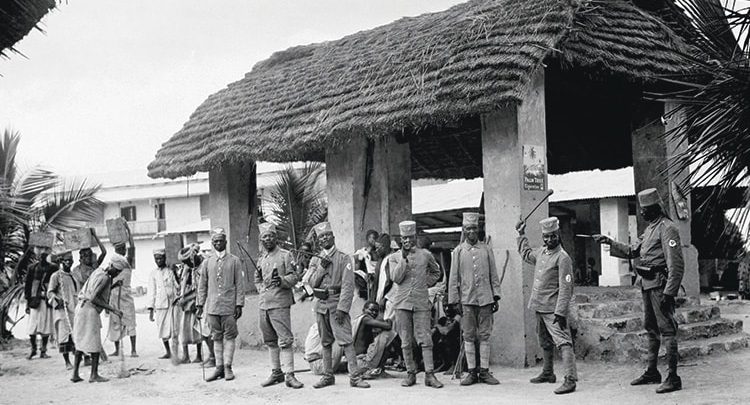
World War I’s East Africa campaign took place in what is modern-day Rwanda, Burundi and Tanzania. Under European administration of the colony, the popularity of colonial expansion represented a hopeful resurgence of German supremacy which was to be paralleled to that in Europe. However, a weak military presence and poorly equipped troops meant that (much like the other colonizers), German military on the African continent only held enough might and prowess to support colonial repression, not necessarily fight or wage wars against opposing colonial powers.
The German Colony in East Africa posed the greatest threat to the Belgian-controlled Congo. Belgium viewed hostilities in East Africa as an opportunity to expand their foothold in Africa and to ensure Belgium’s restoration after the war. During negotiation at the Treaty of Versailles, powers sought to trade Belgian territorial gains in German controlled East Africa for parts of Portuguese controlled Angola in order to gain a longer coastal territory for the Belgian Congo.
German East Africa and Resource Warfare
European colonial powers in Africa fought a series of guerrilla wars and battles to control pivotal strongholds and resources all over the continent. One such instance, the Battle for Lake Tanganyika, occurred when the German-controlled lake came under attack by British forces in 1915. The British forces outmaneuvered the Germans in military superiority, deftly dashing their weak naval control over Lake Tanganyika in less than a year.
Analysis
Throughout the many years of battle and high human cost, nearly half a million persons participated in the East Africa campaign, assisted with an additional 600,000 African bearers. Casualties in German East Africa were not meticulously recorded, although recent estimates put the numbers around 102,000, many of which dies of diseases brought over by the Europeans. With a noble attempt in fighting off British invasions, the German military was not able to divert the necessary amount of power away from the Allied forces to make a significant impact in the war.


